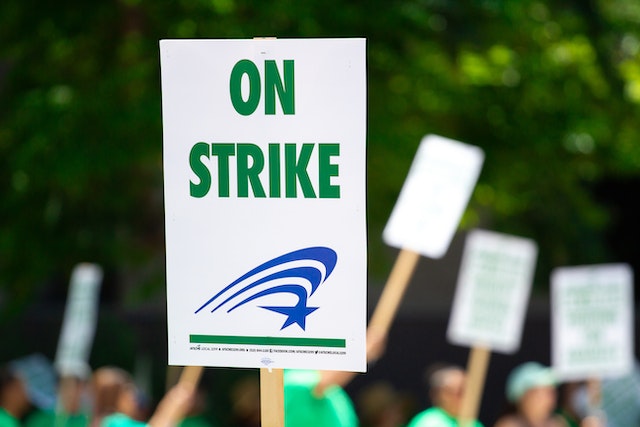
Why is a strike called a “strike”? Because sailors in 1768 struck their ships.
To strike a ship means to take off its topsail, making the ship incapable of movement. The word “stricken” comes from the same place. As in, the ship was stricken on the rocks. On a ship, the command to take down one of the sails would be, “strike the mainsail” or “strike the topsail”. Taking the flag down is known as “striking the colors”.
In 1762, sailors in Liverpool, UK, stopped work to demand a pay increase. Then, in 1765, coal miners across the north of England stopped work to get a higher wage. Then, in April of 1768, the sailors in Sunderland docks, a major UK port of exporting coal, stopped work. They went a step further than just laying down their tools and disabled their ships so the port was unusable. They did it by striking their sails. The sailors won and their pay went up. Other sailors in London used the same tactic in May and struck their ships. They also won. News of the sailors’ actions appear to have zoomed around the country in the news and they were associated with the word “strike”. It was only a couple of weeks later and the word was being used for non-sailor stoppages. On May 7th, 1768, the St James’s Chronicle and The British Evening Post announced that hatters in London were “striking”. And the word became connected to laying down tools in protest.
Striking has become fairly common these days. However, it wasn’t always like that. The very first recorded strike was in Ancient Egypt, in the 12th century BC. It happened in about 1152 BC, heading up to the 30th year of the reign of Ramesses III. Egypt had peaked in power during his father’s reign, and Ramesses III is known as the last of the “great” pharaohs. He did his best to hold Egypt together, but the invading sea peoples, trade problems, and the financial costs of all his battles were contributing to put strain on the country. These economic problems were behind the first ever strike in history.
Preparations for Ramesses III’s 30th anniversary were underway, but it was proving difficult to find the money to pay people. The tomb-builders and artisans in the artisan’s village at Thebes hadn’t been paid for a while. They put up with it for as long as they could before putting down their tools and marching on Thebes. They had a sit-in at the temple of Thutmose III. They finally got their pay, but the underlying problem wasn’t fixed, so their pay was late again the next month, and the next. Every time, they marched on the city again. Finally, they marched on the Valley of the Kings and blockaded it so no priests or family members of the deceased could get in, thereby starting the world’s first picket line. It took a while, but the problem was eventually sorted out.
There have been strikes on and off throughout history. There was a general strike in Rome in the 6th century BC. The citizens were so unhappy with the way that things were being run that they abandoned the city in protest. With no regular people, the city couldn’t run and the rulers had no choice but to capitulate. However, other than these few examples, striking was relatively rare because labor was fairly cheap. If someone refused to work, there was usually someone else who would. And the majority of people were involved in agriculture, which was not really a job that you could strike from.
This is why, striking didn’t really take off until the Industrial Revolution. Enormous numbers of people moved to the cities and a new “working class” was born. People worked for an hourly wage and worked machinery. These new industries and the new mass of people required huge amounts of coal, which required miners and people to transport the coal. With all of these jobs, people suddenly realized that they had more power than they ever had before. If they weren’t happy with their pay, they could stop working. Maybe their employers could find more people, but maybe they couldn’t. And they would lose a lot of money in the meantime because the coal wouldn’t be moving. Thus, the idea of striking for pay, or for conditions began. And the new custom of throwing down tools and demanding better work and conditions needed a name. Just as the sailors in Sunderland “struck” their ships. And this is what I learned today.
Sources
https://jacobin.com/2018/05/strikes-history-london-sailors-coal-heavers
https://nvdatabase.swarthmore.edu/content/egyptian-laborers-strike-pay-1170-bce
https://en.wikipedia.org/wiki/Strike_action
https://www.worldhistory.org/article/1089/the-first-labor-strike-in-history/
